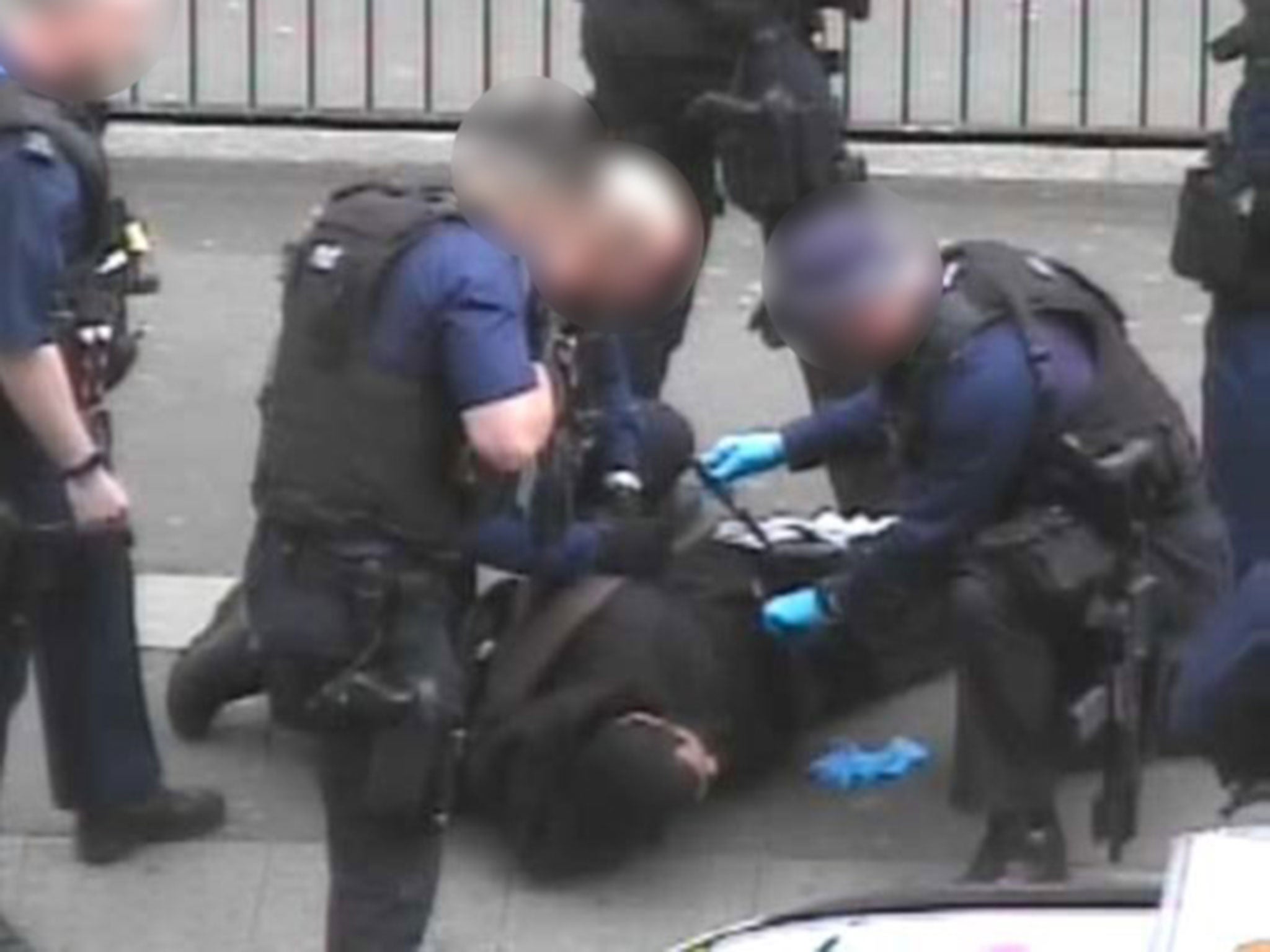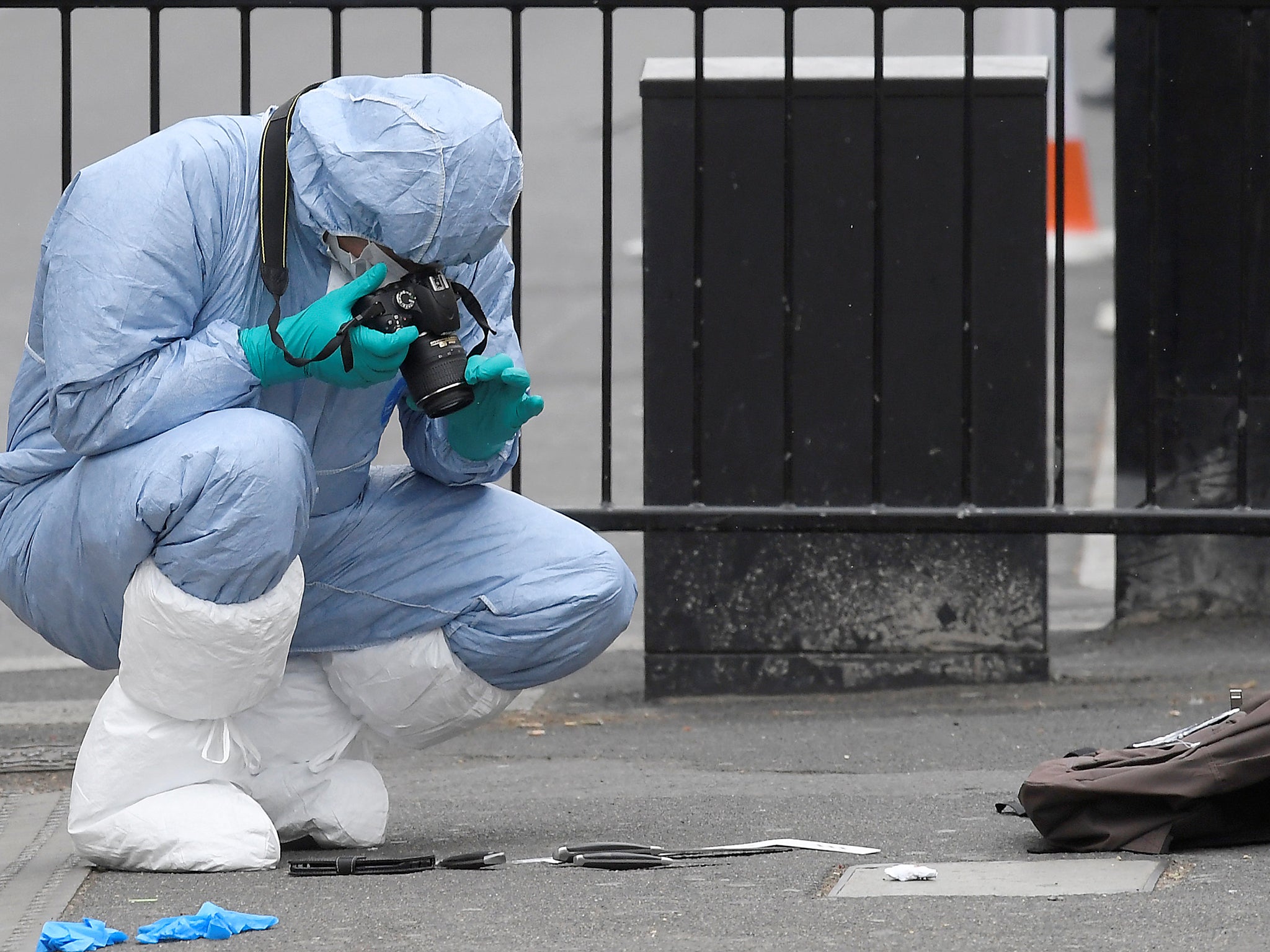Taliban bombmaker convicted of plotting Westminster knife rampage four weeks after terror attack
Khalid Ali trained as a plumber but travelled to Afghanistan in 2011 and planned the atrocity within months of his return
A Taliban bombmaker has been found guilty of planning a stabbing attack in Westminster just four weeks after the UK suffered its first Isis-inspired terror attack.
Khalid Ali was armed with three knives when police tackled him to the ground in front of terrified tourists in Whitehall, just metres from Downing Street and the Houses of Parliament.
Prosecutor Brian Altman QC said the 28-year-old defendant aimed to launch a “deadly terror attack to strike at the very heart of this country’s democracy, by killing a police officer, a member of the military or even a parliamentarian”.
Four months before his arrest, the FBI had matched his fingerprints to two caches of explosives recovered by Afghan forces in 2012, but police said they waited to arrest Ali until the “most appropriate time”.
In an interview with officers, Ali said he wanted to deliver a message to British leaders telling them to leave “Muslim lands”, destroy the state of Israel and release prisoners of war.
“I would consider myself as a mujahid [Islamic warrior],” he added. “Jihad is what we do… and I am here to let you know the reason why I have come with the message, for you to make the right decisions, if not… we have a lot of time. UK is next on the list.”
Ali declared his loyalty to the Taliban and told how he made bombs and “pressed the button” more than 300 times in attacks targeting American and British soldiers spanning five years.

He denied terror offences but when asked why he was carrying knives on the day of his arrest, Ali replied: “I had the knives ready to kill, but only in self-defence.”
He did not react while being convicted of explosives offences committed abroad and preparing an act of terrorism in Britain, following three days of jury deliberations.
Judge Nicholas Hilliard QC remanded Ali in custody to be sentenced on 20 July.
He had joined the Taliban in Afghanistan in 2011 and did not return home until 2016, soon starting to plan a terror attack on Britain.
Prosecutors said he used an anti-racist march through central London as cover to conduct reconnaissance in March 2017, even talking to police officers guarding Downing Street.
The following month, he scouted out the MI6 building, Westminster Bridge and the Houses of Parliament, where he photographed cameras, guards and potential access points.
While working at a friend’s pizza shop in Ealing, he bought a set of five knives and took them back to his mother’s house on 26 April last year.
But Fadumo Haji Adam was already alarmed about her son’s strange behaviour and called the police after finding the weapons on his bedroom floor.
“She said that she had found knives in her son’s bedroom and that she was scared he was going to kill the family,” Mr Altman told the court.
Ali told officers who visited the house shortly after midnight that he had no idea why his mother had called them, taking the opportunity ask about how powerful their Tasers were before fleeing the house.
Asked if she wanted him to be arrested, Ms Adam said: “No, no, no. I just want him leave.”

He rearmed himself at a shop in Ealing the following morning, bought a rucksack emblazoned with a British flag and prepared for his attack in a gym changing room.
Ali stashed three new knives within easy reach in his jacket pockets and the waistband of his trousers as he journeyed towards central London.
A phone Ali dumped in the Thames shortly before his arrest was found to contain Islamic songs that prosecutors said he listened to for inspiration while planning his attack.
Police body camera footage showed officers spotting Ali, who had been under surveillance, walking down Whitehall and surrounding him within seconds as tourists ran.
As he was forced to the ground at gunpoint, he was asked if the public were in danger but he told police he did not care.
On whether there was a risk to anyone else, he allegedly replied: “You lot are carrying weapons, so you must know you are in danger.”
His family told how he trained as a gas fitter and plumber at college and started working for his brother’s business, but started to wear Islamic attire, grow a beard and frequently attend a mosque in early 2010.
That year he joined the Road to Hope aid convoy to Gaza, where he was among British citizens kidnapped on a Greek ship before being freed.
In 2011, he told his family he was moving to Birmingham for work as a pretence to travel to Afghanistan via Abu Dhabi, and did not speak to them for five and a half years.
Police launched a missing person case that continued until Ali surfaced at the British consulate in Istanbul in 2016, claiming he had lost his passport and asking for emergency travel documents to return to the UK.
Suspicious officials raised the alarm and Ali was arrested upon arrival at Heathrow, but he claimed he had been travelling and denied any affinity with extremism before being released.
Fingerprints taken during the stop were matched to those recovered by American authorities on a cache of bomb components seized from the Taliban.
Ali said he had originally left the UK because he was under pressure to marry and felt trapped as MI5 and counterterrorism police allegedly tried to recruit him.
When questioned in court, he told the jury he had merely travelled to Pakistan for “tourism and hitchhiking” but was taken captive by the Taliban.
Pushed to explain why his fingerprints were all over bomb components, Ali claimed that he was forced to do the work at gunpoint to prove he was not a British spy.
He also claimed he was only carrying knives in Westminster for protection in case he was attacked while trying to deliver his message to decision-makers.
Ali’s arrest took place on the same day the UK’s first all-female jihadi gang were detained for an unrelated terror plot that also targeted Westminster.
Deputy Assistant Commissioner Dean Haydon, of the Metropolitan Police, said: “This case demonstrates how close the UK counterterrorism network works with partners and allies to bring to justice those seeking to harm others across the world.
“He is an incredibly dangerous individual who had returned from a terrorist training camp in Afghanistan with a determination to kill, we believe, police, the military or parliamentarians in the UK.”
Mr Haydon said there was a “time lag” between the FBI linking Ali to the Taliban bombs and his arrest because “due legal process” needed to be followed to collect the evidence from abroad.
He defended the decision not to move in before Ali was armed and within metres of the Houses of Parliament, saying police and security services were “managing any potential risk he posed and he was arrested at the most appropriate time”.
Scotland Yard says 16 attacks have been foiled since last March, including four right-wing extremist plots.
A report by Europol found that the UK suffered the most deaths in terror attacks and the highest number of planned and executed attacks in Europe in 2017.
Additional reporting by PA
Bookmark popover
Removed from bookmarks